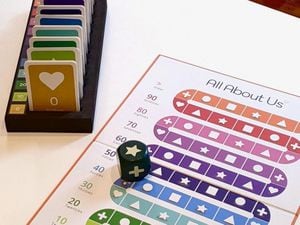University of Wolverhampton helps create board game for dementia sufferers
A new board game to help dementia sufferers understand their new life has been created by University of Wolverhampton.

All About Us has been released to help boost the self-confidence and wellbeing of people with dementia as they adjust to their diagnosis.
University of Wolverhampton researchers worked with professional care experts, designers, people with dementia and other international university researchers to jointly develop the game.
The game uses questions as conversation starters to enable players to reminisce about their childhood, think about their hopes for the future and what is important to them in their lives.
Dr Tina Smith and Dr Jennifer Lim, from the University of Wolverhampton’s Faculty of Education, Health and Wellbeing, were part of the MinD project team involved in the development and evaluation of the game.
Dr Tina Smith said: "It was a great experience to be part of a multinational team and work alongside people with dementia in the research and design process, in such a positive and meaningful way.
"It’s excellent to see the research culminating in the release of the game for sale to the public. This is a great example of putting research into practice, with the development of a product that has the potential to make a positive impact on the lives of people with dementia."
Maggie Ayliffe, head of the University of Wolverhampton School of Art, added: "This project was a great opportunity to show how creative fields like design can have a real impact on people’s lives. It allowed designers and researchers to work directly with people with dementia and involve them in the design process, which was a valuable experience.
"This type of collaboration is key for successful design and forms part of an increasing portfolio of work at the School enabling artists and designers to use their creative skills to ‘give voice’ to wide range of health care issues affecting our communities."
Research, which evaluated the game with 50 people living with dementia and their carers across four countries who played All About Us, is published in the Journal of Aging Studies and evidences the benefits of the game.
Participants in the evaluation said that the game, which is based on a combination of life-storytelling and mindfulness, was enjoyable, helped them learn and accept the past and present situation, and that they felt that looking forward into the future together with others could be helpful.
The study demonstrates design can be a useful means to support people with dementia in their emotional wellbeing, social engagement and sense of agency.
Ben Atkinson-Willes, founder and CEO of Relish, said: "Enabling wellbeing for people with dementia is what drives us. Pivotal to that in early to mid-stages of dementia is maintaining a sense of identity and purpose, and of course, relationships."





